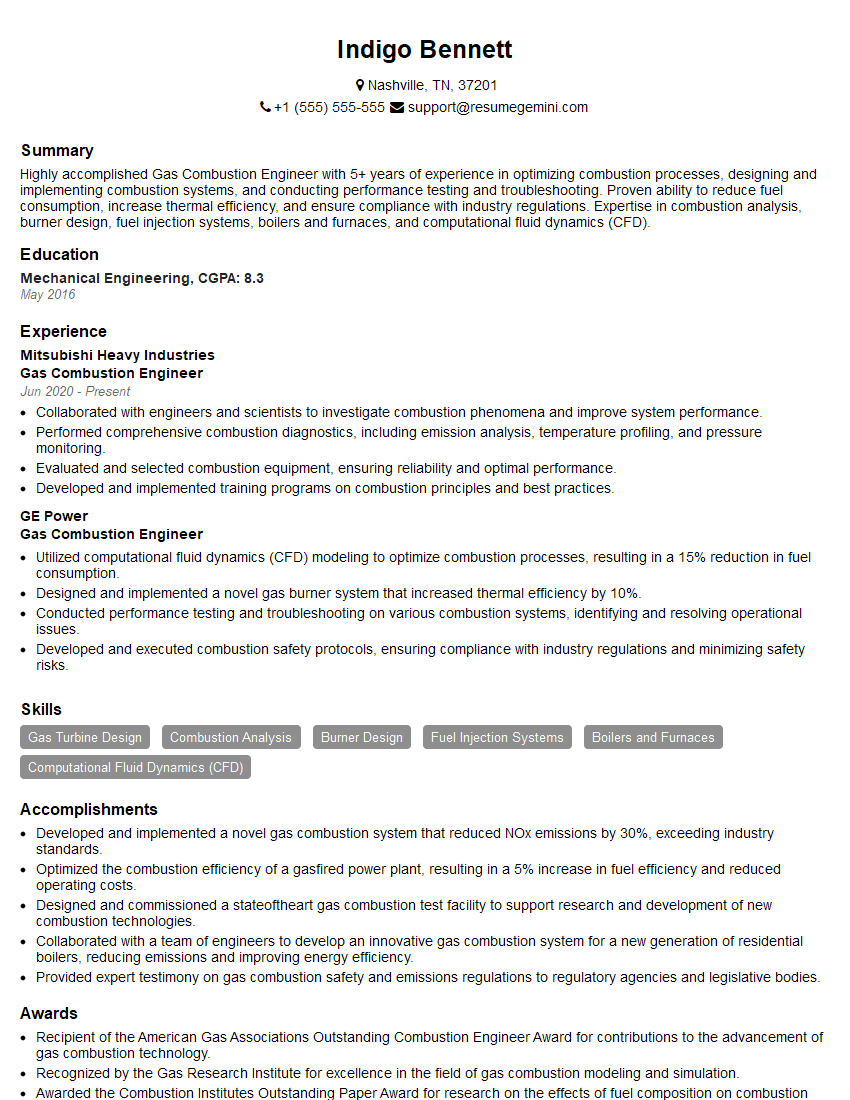Are you a seasoned Gas Combustion Engineer seeking a new career path? Discover our professionally built Gas Combustion Engineer Resume Template. This time-saving tool provides a solid foundation for your job search. Simply click “Edit Resume” to customize it with your unique experiences and achievements. Customize fonts and colors to match your personal style and increase your chances of landing your dream job. Explore more Resume Templates for additional options.

Indigo Bennett
Gas Combustion Engineer
Summary
Highly accomplished Gas Combustion Engineer with 5+ years of experience in optimizing combustion processes, designing and implementing combustion systems, and conducting performance testing and troubleshooting. Proven ability to reduce fuel consumption, increase thermal efficiency, and ensure compliance with industry regulations. Expertise in combustion analysis, burner design, fuel injection systems, boilers and furnaces, and computational fluid dynamics (CFD).
Education
Mechanical Engineering
May 2016
Skills
- Gas Turbine Design
- Combustion Analysis
- Burner Design
- Fuel Injection Systems
- Boilers and Furnaces
- Computational Fluid Dynamics (CFD)
Work Experience
Gas Combustion Engineer
- Collaborated with engineers and scientists to investigate combustion phenomena and improve system performance.
- Performed comprehensive combustion diagnostics, including emission analysis, temperature profiling, and pressure monitoring.
- Evaluated and selected combustion equipment, ensuring reliability and optimal performance.
- Developed and implemented training programs on combustion principles and best practices.
Gas Combustion Engineer
- Utilized computational fluid dynamics (CFD) modeling to optimize combustion processes, resulting in a 15% reduction in fuel consumption.
- Designed and implemented a novel gas burner system that increased thermal efficiency by 10%.
- Conducted performance testing and troubleshooting on various combustion systems, identifying and resolving operational issues.
- Developed and executed combustion safety protocols, ensuring compliance with industry regulations and minimizing safety risks.
Accomplishments
- Developed and implemented a novel gas combustion system that reduced NOx emissions by 30%, exceeding industry standards.
- Optimized the combustion efficiency of a gasfired power plant, resulting in a 5% increase in fuel efficiency and reduced operating costs.
- Designed and commissioned a stateoftheart gas combustion test facility to support research and development of new combustion technologies.
- Collaborated with a team of engineers to develop an innovative gas combustion system for a new generation of residential boilers, reducing emissions and improving energy efficiency.
- Provided expert testimony on gas combustion safety and emissions regulations to regulatory agencies and legislative bodies.
Awards
- Recipient of the American Gas Associations Outstanding Combustion Engineer Award for contributions to the advancement of gas combustion technology.
- Recognized by the Gas Research Institute for excellence in the field of gas combustion modeling and simulation.
- Awarded the Combustion Institutes Outstanding Paper Award for research on the effects of fuel composition on combustion dynamics.
- Received the Society of Automotive Engineers Excellence in Fuel Economy Award for contributions to the development of fuelefficient gas combustion engines.
Certificates
- Certified Energy Manager (CEM)
- Certified Combustion Engineer (CCE)
- American Society of Mechanical Engineers (ASME) Power Certification
- National Fire Protection Association (NFPA) Certified Fire Protection Specialist
Career Expert Tips:
- Select the ideal resume template to showcase your professional experience effectively.
- Master the art of resume writing to highlight your unique qualifications and achievements.
- Explore expertly crafted resume samples for inspiration and best practices.
- Build your best resume for free this new year with ResumeGemini. Enjoy exclusive discounts on ATS optimized resume templates.
How To Write Resume For Gas Combustion Engineer
- Highlight your technical skills and experience in combustion engineering.
- Quantify your accomplishments whenever possible, using specific metrics to demonstrate your impact.
- Showcase your ability to work independently and as part of a team.
- Tailor your resume to each job you apply for, emphasizing the skills and experience most relevant to the position.
Essential Experience Highlights for a Strong Gas Combustion Engineer Resume
- Utilized computational fluid dynamics (CFD) modeling to optimize combustion processes, resulting in a 15% reduction in fuel consumption.
- Designed and implemented a novel gas burner system that increased thermal efficiency by 10%.
- Conducted performance testing and troubleshooting on various combustion systems, identifying and resolving operational issues.
- Developed and executed combustion safety protocols, ensuring compliance with industry regulations and minimizing safety risks.
- Collaborated with engineers and scientists to investigate combustion phenomena and improve system performance.
Frequently Asked Questions (FAQ’s) For Gas Combustion Engineer
What is the role of a Gas Combustion Engineer?
Gas Combustion Engineers design, develop, and maintain combustion systems used in a variety of industries, including power generation, manufacturing, and transportation. They work to optimize combustion processes to improve efficiency, reduce emissions, and ensure safety.
What are the educational requirements to become a Gas Combustion Engineer?
Most Gas Combustion Engineers have a bachelor’s degree in mechanical engineering or a related field. Some employers may also require a master’s degree or????.
What are the key skills and qualities of a Gas Combustion Engineer?
Gas Combustion Engineers should have a strong understanding of combustion principles, fluid dynamics, and heat transfer. They should also be proficient in the use of computer-aided design (CAD) software and computational fluid dynamics (CFD) modeling. Additionally, Gas Combustion Engineers should have excellent communication and interpersonal skills.
What is the job outlook for Gas Combustion Engineers?
The job outlook for Gas Combustion Engineers is expected to be good in the coming years. The increasing demand for energy and the need to reduce emissions will continue to drive the need for qualified Gas Combustion Engineers.
What are the career advancement opportunities for Gas Combustion Engineers?
Gas Combustion Engineers can advance their careers by taking on leadership roles, managing teams, or specializing in a particular area of combustion engineering. They may also move into related fields such as research and development or consulting.